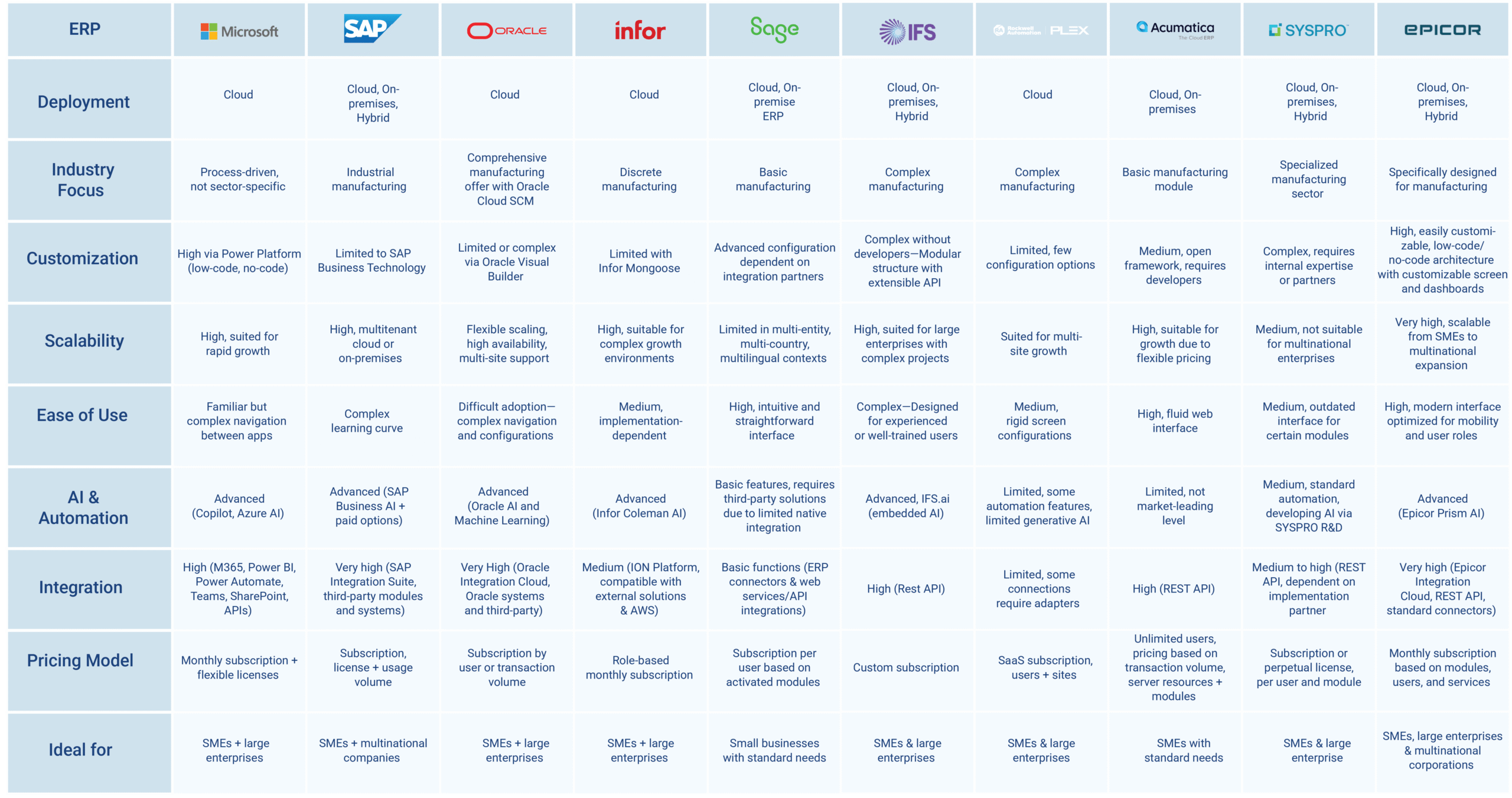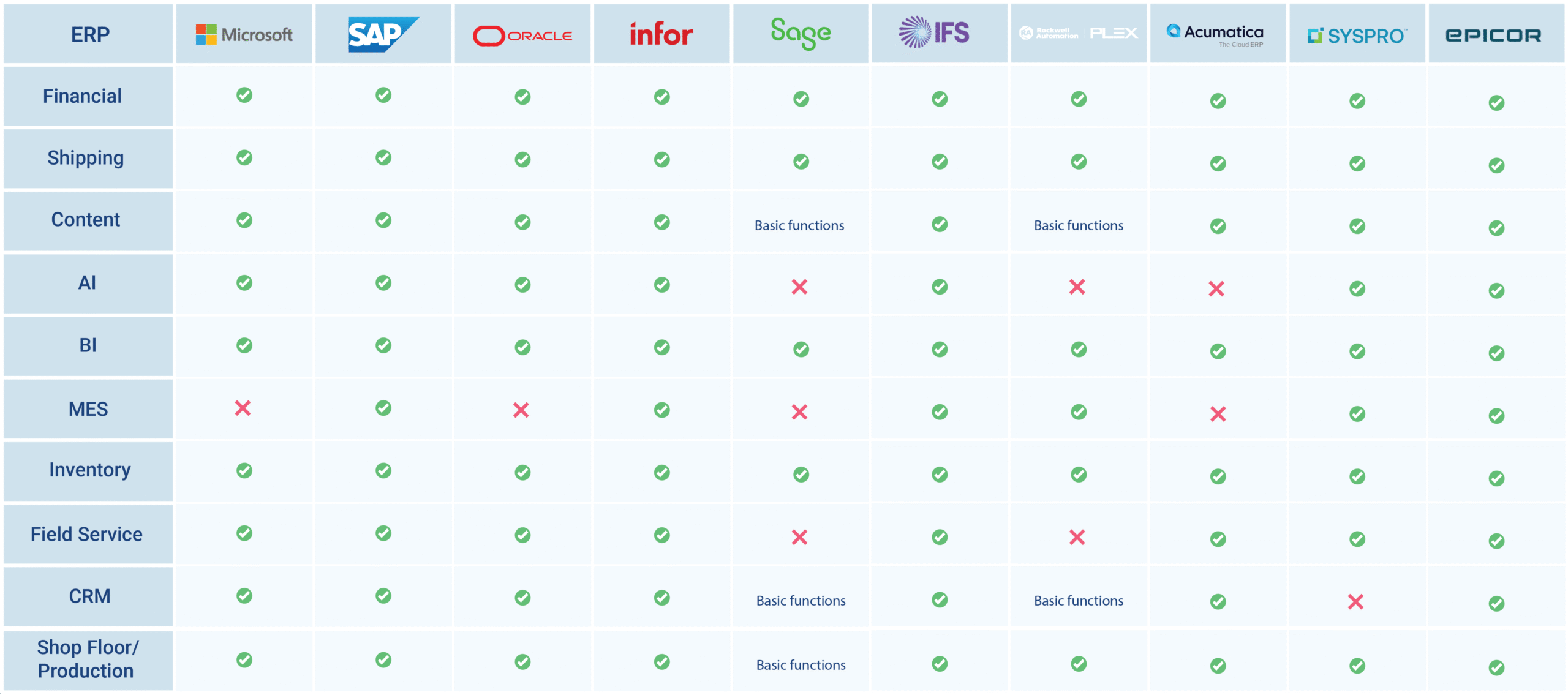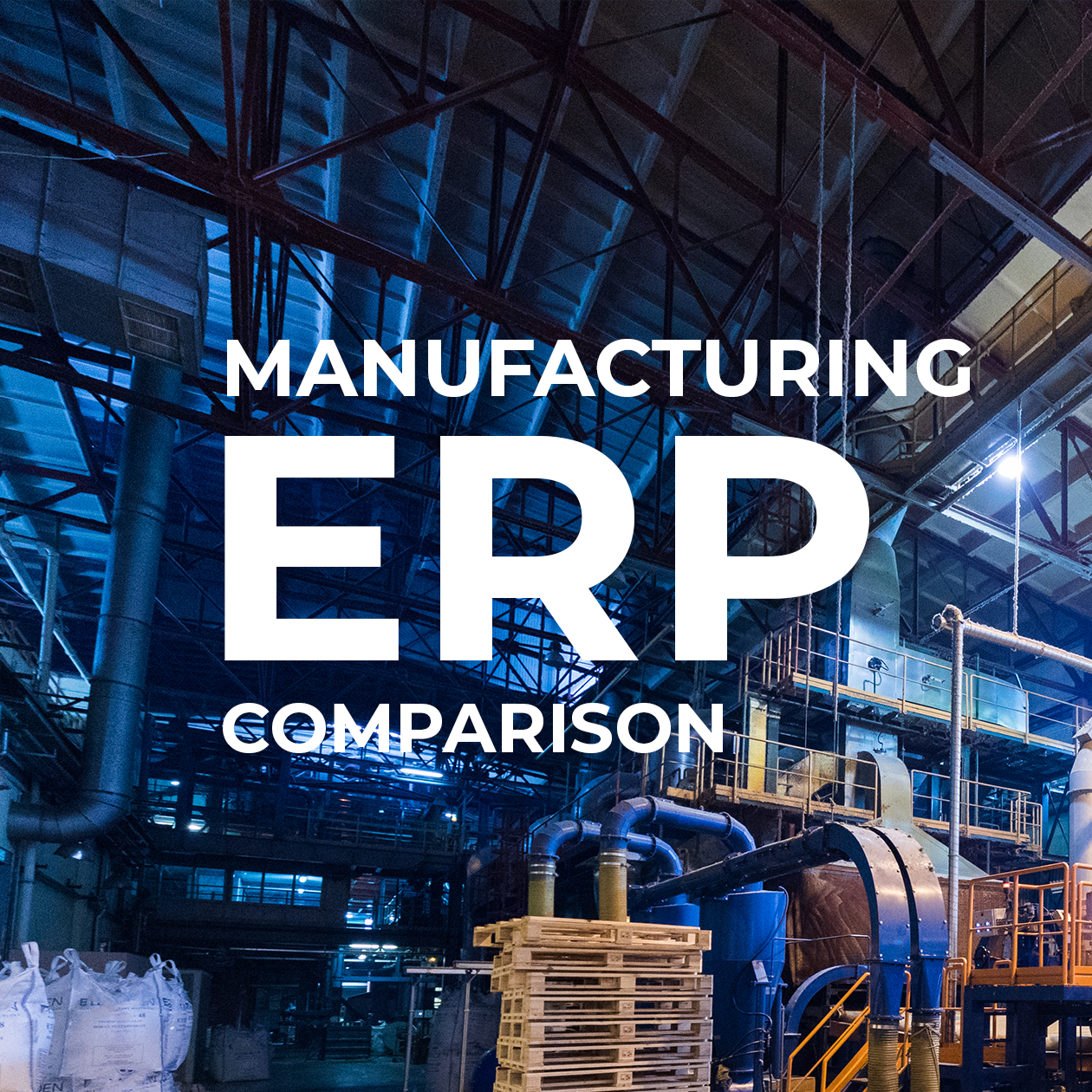Manufacturing ERP Comparison: Find the Right Software for Your Business
Are you looking for the right ERP for your manufacturing organization? This ERP comparison guide offers clear insights, supported by practical analysis and comparative tables.
Schedule a meeting with our experienced ERP consultants today for even quicker guidance.
How This Comprehensive ERP Comparative Guide Helps You Choose the Best Manufacturing Software
- We give you a clear view of the ERP market context: The ERP market evolves quickly. Technologies integrate, solutions multiply, and business needs become increasingly complex.
- We help manufacturing decision-makers understand key issues: Finding an ERP system aligned with your operational realities, while prioritizing long-term performance.
- This guide helps you objectively compare solutions, identify each ERP’s strengths and weaknesses, and select a platform truly designed for your sector.
Quickly Find the Best Manufacturing ERP Software with Our Comparison Table
Explore our manufacturing ERP comparison table, featuring a concise overview of each solution, supported by real user reviews.

Want to learn more about these manufacturing ERP solutions? Explore our concise analyses and honest user reviews.
Microsoft Dynamics 365 stands out with its seamless integration into Microsoft 365, Teams, Power BI, and Azure. It’s designed for businesses seeking a connected platform to automate operations while maintaining a familiar environment.
Here’s what a CFO shared about their experience:
“The audit trails, which include any IP system, are very useful. However, Implementing localizations when we use the system for multiple countries can be quite complex.”
Source: peerspot ⭐⭐⭐⭐⭐
SAP is designed for large enterprises with interconnected business processes. It offers advanced financial management, manufacturing, logistics, and real-time analytics capabilities, featuring a modular approach and strong integration across business functions.
Here’s feedback from a manufacturing industry client:
“The most I like about the SAP service cloud is its integration capabilities with other SAP solutions. What I dislike most is its initial complexity to set up and customize according to the organizational needs.”
Source: Gartner ⭐⭐⭐⭐⭐
Oracle Fusion ERP Cloud is especially valued for its advanced financial capabilities, automated accounting processes, and built-in predictive tools. It’s ideal for large enterprises seeking rigorous governance with strong controls and seamless integration into other Oracle solutions (NetSuite ERP, HCM, SCM, etc.).
Here’s what a real user had to say:
“Good ERP but not user–friendly and very expensive. Strong & well–organized automated business process. It is challenging regarding the development and scalability, expensive, and its running cost is very high & not user-friendly.”
Source: Softwareadvice ⭐⭐⭐
Infor CloudSuite Industrial (formerly SyteLine) is a cloud ERP solution specifically developed for manufacturers. It stands out with its “industry-first” approach and native hosting on AWS. It’s particularly well-suited for discrete manufacturers, offering powerful modules for production, inventory management, and planning.
Here’s feedback from an end user:
“Good, but slow. It is intuitive. Long time of loading page. Sometimes it crashes and you have to begin all over again.”
Source: SoftwareReviews ⭐⭐⭐ 1/2
Sage X3 is designed for mid-sized companies looking for an integrated management solution without the complexity of heavy ERP systems. It covers essential functions (production, inventory, finance) through an intuitive interface, with flexible deployment options (cloud or on-premises).
Here’s feedback from a Sage user in the food industry:
“Sage X3 is very complete in terms of daily accounting management features and advanced tax functionalities. However, it offers limited flexibility in use: system restrictions and various blockages depending on user roles.”
Source: Capterra ⭐⭐⭐⭐⭐
IFS Cloud is built for industrial companies with complex, project-oriented operations. It natively integrates project management, maintenance, manufacturing, field service, and finance into a unified platform. Its modular architecture and strong cloud capabilities make it popular in the aerospace, energy, and advanced manufacturing sectors.
Here’s feedback from a user in the electrical/electronics manufacturing sector:
“Most of our departments use it across the company—financials, manufacturing, maintenance, sales, logistics, engineering, etc. Good integration options and nice programming interface. However, like many ERPs, the user interface has lots of things that users will ignore or IT has to hide. If you have a weird process that isn’t the norm in the industry, it will take more work to implement it.”
Source: GetApp ⭐⭐⭐⭐⭐
Plex is a fully cloud-based ERP platform, designed from the ground up for manufacturers. It integrates MES, QMS, and ERP modules into a unified environment, offering strong capabilities in traceability, shop floor automation, and quality control. It’s particularly well-suited for multi-site manufacturing SMEs.
Here’s feedback from a user in the automotive manufacturing sector:
“I like the fact that it is hosted in the Cloud to allow us to not have hardware onsite. However, Getting things fixed in UX takes too long. We have to wait for a long time to get missing features from Classic put back into UX and fix bugs.”
Source: G2 ⭐⭐⭐
Acumatica stands out with its unique pricing model based on system usage rather than the number of users, making it an attractive option for growing SMEs. The interface is modern, easy to navigate, and the platform is highly customizable with a wide range of business modules.
Here’s feedback from a user in the manufacturing sector:
“The UI is simple and functional. The support team responds quickly when we have an issue. However, maintaining reports made with Velixo can be cumbersome, maintaining role groups can be a struggle when single-sign-on breaks, and the recurring transaction function does not improve efficiency.”
Source: Gartner ⭐⭐⭐⭐⭐
SYSPRO is an ERP system specifically designed for mid-sized manufacturing companies and distributors. It offers deep coverage of production, inventory, financial management, and supply chain processes, with a flexible architecture (cloud or on-premises) and a customizable interface.
Here’s feedback from a user at a manufacturing SME:
“I like that SYSPRO uses standard MS SQL on the back end. However, the professional support service lacks experience.”
Source: G2 ⭐⭐ 1/2
Epicor Kinetic is built for mid-sized to large manufacturers. It is recognized for its integration of advanced ERP modules for production, planning, shop floor management, inventory optimization, and predictive analytics powered by AI. Its modular structure, modern interface, and ability to scale with the business make it particularly well-suited for complex manufacturing environments.
Here’s feedback from real users who migrated from SAP to Kinetic:
- “We moved from SAP Business One to Kinetic. The tool is much more intuitive and focused on the real needs of a manufacturer.”
- “Implementation requires strong support. This isn’t an ERP you can deploy without specialized expertise..”
Source: Reddit
Additional feedback from a manufacturing industry player:
“We operate in one of the most challenging and dynamic industries where quality, costs, traceability and delivery are paramount. Epicors robust capabilities have been instrumental in helping us meet and exceed customer expectations.
I think the cloud patching schedule could be enhanced to allow more flexibility to its customers via providing an extra environment (fallback) during downtimes for upgrades.”
Source: Gartner ⭐⭐⭐⭐⭐
Find Out If Epicor Kinetic Is Right for You. Talk to Our Consultants Today.
Ready to Estimate the Cost of an ERP System Truly Built for Manufacturing?
ERP Module Integration Comparison by Manufacturing Solution
Does the ERP system include a financial or MES module? Compare the additional features available with each manufacturing ERP. Explore our summary table to quickly identify the strengths and limitations of each system.
ERP Modules Comparison Table

How to Choose the Right ERP Software Solution Based on Your Business Needs
Every ERP choice should be based on your business objectives. Here are a few key questions to guide your decision.
- Small to mid-sized businesses typically prioritize a flexible, fast-to-deploy ERP with controlled costs.
- Large organizations and multinational manufacturing businesses will seek a highly scalable, multi-site, multi-currency solution with strong integration and automation capabilities.
- Open-source ERPs are generally not recommended for businesses with complex or highly regulated operations.
- Some ERPs are tailored to specific industries and come with pre-built business modules.
- If your company requires specialized modules (such as MES, WMS, or multi-warehouse management), prioritize an ERP that can support your processes from the start. For example, an ERP with an advanced MES module will help you monitor real-time production more effectively.
- Simplicity: Choose an intuitive ERP if you have limited in-house IT resources
- Flexibility: Opt for a highly customizable ERP if your processes are unique.
- Scalability: Invest in a platform that can grow with your business without needing a major overhaul.
- User Experience: Prioritize modern, mobile-friendly interfaces to maximize adoption among your teams.
Epicor: An ERP Solution Built for the Realities of Manufacturing
Epicor Kinetic isn’t a generic ERP adapted by chance. It’s purpose-built to address the unique challenges manufacturers face. Its strength lies in a sector-specific approach and ready-to-use functionalities from the moment of implementation.
- Out-of-the-Box Approach: Integrated business modules for advanced manufacturing, Customer Relationship Management (CRM), warehouse management, and more.
- Industry Specialization: Solutions tailored for complex industrial environments — no need for excessive customization.
- Flexible Deployment: Choose cloud, on-premises, or hybrid, depending on your operational needs.
- rue Scalability: Epicor supports the growth of ambitious SMEs as well as large international enterprises.
- User Experience: Modern interfaces, built-in mobility, and embedded analytics to drive real-time decision-making.
Ready to Explore your ERP Options?
Make an informed choice tailored to your business reality. Our experts are here to guide you every step of the way.


